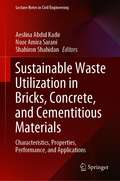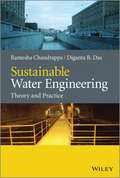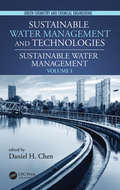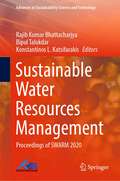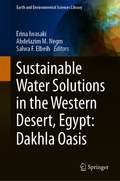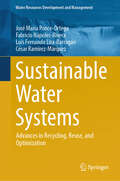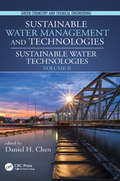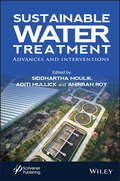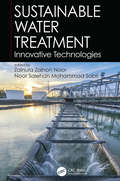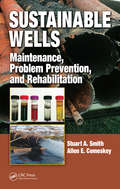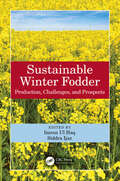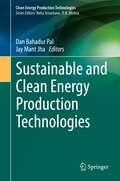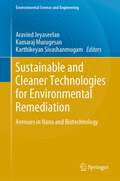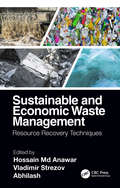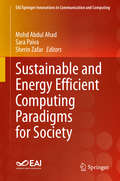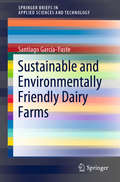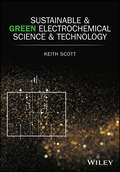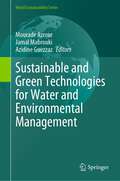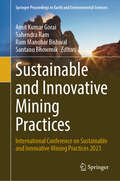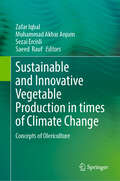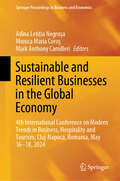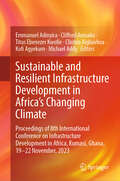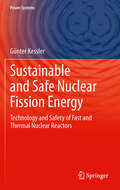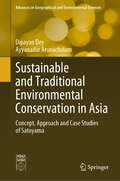- Table View
- List View
Sustainable Waste Utilization in Bricks, Concrete, and Cementitious Materials: Characteristics, Properties, Performance, and Applications (Lecture Notes in Civil Engineering #129)
by Shahiron Shahidan Aeslina Abdul Kadir Noor Amira SaraniThis book highlights the current research, conceptual and practical utilization of waste in building materials. It examines the production of industrial and agricultural wastes that have been generated worldwide and have significant environmental impact. The book discusses how to incorporate these wastes effectively with greener technology and how to address its environmental impact in order to produce environmentally friendly and sustainable green products. This book also will capitalize on its practical application, properties, performance and economic advantages. The topics covered include the physical, mechanical and environmental properties, leaching behaviour, gas emissions and performance of sustainable construction materials. This book offers a valuable reference for researchers, industries and interested stakeholders in sustainable construction or any allied fields.
Sustainable Water Engineering
by Diganta B. Das Ramesha ChandrappaEnsuring safe and plentiful supplies of potable water (both now and for future generations) and developing sustainable treatment processes for wastewater are among the world's greatest engineering challenges. However, sustainability requires investment of money, time and knowledge. Some parts of the world are already working towards this goal but many nations have neither the political will nor the resources to tackle even basic provision and sanitation. Combining theory and practice from the developing and developed worlds with high- and low-tech, high- and low-cost solutions, this book discusses fundamental and advanced aspects of water engineering and includes: water resource issues including climate change, water scarcity, economic and financial aspects requirements for sustainable water systems fundamentals of treatment and process design industrial water use and wastewater treatment sustainable effluent disposal sustainable construction principles With integrated theory, design and operation specifications for each treatment process, this book addresses the extent to which various treatment methods work in theory as well as how cost effective they are in practice. It provides a nontechnical guide on how to recover and reuse water from effluent, which is suitable for those in water resource management, environmental planning, civil and chemical engineering.
Sustainable Water Management (Green Chemistry and Chemical Engineering)
by Daniel H. ChenWhile the world’s population continues to grow, the availability of water remains constant. Facing the looming water crisis, society needs to tackle strategic management issues as an integrated part of the solution toward water sustainability. The first volume in the two-volume set Sustainable Water Management and Technologies offers readers a practical and comprehensive look at such key water management topics as water resource planning and governance, water infrastructure planning and adaption, proper regulations, and water scarcity and inequality. It discusses best management practices for water resource allocation, ground water protection, and water quality assurance, especially for rural, arid, and underdeveloped regions of the world. Timely topics such as drought, ecosystem sustainability, climate change, and water management for shale oil and gas development are presented. Discusses best practices for water resource allocation, ground water protection, and water quality assurance. Offers chapters on urban, rural, arid, and underdeveloped regions of the world. Describes timely topics such as drought, ecosystem sustainability, climate change, and water management for shale oil and gas development. Covers water resource planning and governance, water infrastructure planning and adaptation, proper regulations, and water scarcity and inequality Discusses water resource monitoring, efficiency, and quality management.
Sustainable Water Resources Management: Proceedings of SWARM 2020 (Advances in Sustainability Science and Technology)
by Rajib Kumar Bhattacharjya Bipul Talukdar Konstantinos L. KatsifarakisThis book brings high-quality selected research articles from the international conference on Sustainable Water Resources Management (SWARM 2020), held at Assam Engineering College, Guwahati, Assam, India, during 19–21 June 2020. The book focuses on water management and planning, urban water management, climate change and global warming, management of groundwater and aquifer remediation, water conservation, water quality, pollution control, management of trans-boundary rivers, advanced hydrological modelling and hydro-disaster risk management of sustainable water management.
Sustainable Water Solutions in the Western Desert, Egypt: Dakhla Oasis (Earth and Environmental Sciences Library)
by Abdelazim M. Negm Salwa F. Elbeih Erina IwasakiThis book is a multidisciplinary manuscript bringing together contributions on water issues from natural and social scientists focused on water management and structures in a challenging environmental situation such as Dakhla Oasis in Egypt's western desert. The authors of this book are relevant scientists in hydrology, geology, remote sensing, agriculture, history, and sociology. It is devoted to various critical environmental topics such as geological and hydraulic structure, climate influence, underground water management, irrigation management, and human settlement. The book provides a range of new perspectives on solving different environmental problems in arid zones toward the region's sustainable development, based on the case studies and fieldwork in the Dakhla Oasis (Western Desert, Egypt).
Sustainable Water Systems: Advances in Recycling, Reuse, and Optimization (Water Resources Development and Management)
by José María Ponce-Ortega César Ramírez-Márquez Fabricio Nápoles-Rivera Luis Fernando Lira-BarragánThis book explores advanced recycling and optimization techniques, offering a blend of practical case studies and theoretical models that push the boundaries of traditional water management practices. Each chapter covers various aspects of sustainable water management, from the reuse of wastewater in residential complexes to the design of eco-industrial parks. By integrating environmental engineering, economics, and urban planning, the book addresses the pressing need for sustainable water solutions, presenting cutting-edge optimization models and economic analyses crucial for professionals and decision-makers. The incorporation of dynamic and strategic planning in the context of environmental constraints and uncertainties makes it an essential resource for navigating the complexities of modern water systems. Providing innovative strategies for a sustainable future, this book stands as a pivotal work in the field of water resource management.
Sustainable Water Technologies (Green Chemistry and Chemical Engineering)
by Daniel H. ChenDevelopment of advanced technologies is a critical component in overcoming the looming water crisis. Stressing emerging technologies and strategies that facilitate water sustainability for future generations, the second volume in the two-volume set Sustainable Water Management and Technologies provides current and forthcoming technologies research, development, and applications to help ensure availability of water for all. The book emphasizes emerging nanotechnology, biotechnology, and information technology applications as well as sustainable processes and products to protect the environment and human health, save water and energy, and minimize material use. It also discusses such topics as groundwater transport, protection, and remediation, industrial and wastewater treatment, reuse, and disposal, membrane technology for water purification and desalination, treatment and disposal in unconventional oil and gas development, biodegradation, and bioremediation for soil and water. Stresses emerging technologies and strategies that facilitate water sustainability. Covers a wide array of topics including drinking water, wastewater, and groundwater treatment, protection, and remediation. Discusses oil and gas drilling impacts and pollution prevention, membrane technology for water desalination and purification, biodegradation, and bioremediation for soil and water. Details emerging nanotechnology, biotechnology, and information technology applications, as well as sustainable processes and products.
Sustainable Water Treatment: Advances and Interventions
by Siddhartha Moulik Anirban Roy Aditi MullickSUSTAINABLE WATER TREATMENT This outstanding new volume is a compendium of reference material which will cover most of the relevant and state-of-art approaches in the field of water treatment, focusing on technological advances for water treatment in four categories: advanced oxidation technologies, nanoparticles for water treatment, membrane separations, and other emerging technologies or processes. Apart from this perspective, fundamental discussions on a wide variety of pollutants have also been included, such as acidic wastewater treatment, metallurgical wastewater, textile wastewater as well as groundwater. The editors have not only covered a wide range of water treatment techniques, but also focus on their applications, offering a holistic perspective on water treatment in general. Covering all of the latest advances, innovations, and developments in practical applications for sustainable water treatment, this volume represents the most comprehensive, up-to-date coverage of the issues of the day and state of the art. Whether for the veteran engineer or scientist or a student, this volume is a must-have for any library. Sustainable Water Treatment: Advances and Interventions covers: Provides an insight into various sectors of water and wastewater treatment technologies, introducing key technical topics Is a comprehensive guide to technological interventions for water and wastewater treatment Is also a reference book for any elective course on water treatment for engineers, scientists, and students, at both the undergraduate and graduate levels Presents the most current and up-to-date advances in sustainable water treatment Covers key technical topics and gives readers a comprehensive understanding of the latest research findings Includes perspectives on future trends and challenges
Sustainable Water Treatment: Innovative Technologies
by Zainura Zainon Noor and Noor Salehan Mohammad SabliThis book focuses on green and innovative wastewater treatment technologies that promote sustainability. It discusses a variety of biological, physical, and chemical treatment technologies. It covers biological processes for recovery of value-added products from wastewater and gives an overview of enzymatic hydrolysis and bioremediation of wastewater using immobilized enzyme and fungus. It offers a case study and future trends of wastewater treatment through membrane bioreactor technologies, describes advanced chemical–physical processes for recalcitrant pollutant, and emphasizes the use of low-cost materials and cost-effective treatment methods.
Sustainable Water and Environmental Management in the California Bay-Delta
by Committee on Sustainable Water Environmental Management in the California Bay-DeltaExtensively modified over the last century and a half, California's San Francisco Bay Delta Estuary remains biologically diverse and functions as a central element in California's water supply system. Uncertainties about the future, actions taken under the federal Endangered Species Act (ESA) and companion California statues, and lawsuits have led to conflict concerning the timing and amount of water that can be diverted from the Delta for agriculture, municipal, and industrial purposes and concerning how much water is needed to protect the Delta ecosystem and its component species. Sustainable Water and Environmental Management in the California Bay-Delta focuses on scientific questions, assumptions, and conclusions underlying water-management alternatives and reviews the initial public draft of the Bay Delta Conservation Plan in terms of adequacy of its use of science and adaptive management. In addition, this report identifies the factors that may be contributing to the decline of federally listed species, recommend future water-supple and delivery options that reflect proper consideration of climate change and compatibility with objectives of maintaining a sustainable Bay-Delta ecosystem, advises what degree of restoration of the Delta system is likely to be attainable, and provides metrics that can be used by resource managers to measure progress toward restoration goals.
Sustainable Wells: Maintenance, Problem Prevention, and Rehabilitation
by Stuart A. Smith Allen E. ComeskeyNo one has recorded when well digging started, but surely humans imitated elephants in digging holes in the sand to access cooler water that didn't make the children sick. Eventually, humankind began to redesign, maintain, and repair the wells they constructed, but when wells became "commodities" in the twentieth century, this maintenance ethic was
Sustainable Winter Fodder: Production, Challenges, and Prospects
by Imran Ul Haq Siddra IjazForage crops are an essential component of livestock’s diet. Production and availability of sufficiently good quality forage under diverse ecological dynamics are fundamental to develop an efficient and productive livestock industry. Growers worldwide, especially in developing and underdeveloped countries, face significant challenges in producing sufficient winter fodder. The livestock population is increasing at high rates, and its feed requirement is increasing accordingly. Fodder crops are the leading and cheapest source of feed for livestock; however, the shortage of fodder production is the primary limiting factor for livestock production. This book features an extensive overview of literature providing information on winter fodders used in livestock management. Key features Discusses breeding strategies of winter fodders through conventional approaches and biotechnology. Highlights production, agronomy, and bioecology of winter fodder crops. Provides comprehensive information on the ecological dynamics of winter fodders. Describes the use of precision agriculture for mitigating the effect of climate change on winter fodders. Relays challenges of winter fodder crops on account of microbes, toxins, pests, and diseases. This book is written for researchers and practitioners in agronomy, biotechnology, bioecology and is a comprehensive guide for improving winter fodder production.
Sustainable and Clean Energy Production Technologies (Clean Energy Production Technologies)
by Dan Bahadur Pal Jay Mant JhaThis edited book is a comprehensive collection of chapters on various clean energy technology such as solar energy, waste biomass as energy, hydro-electricity generation, biodiesel production from biomass and strategies to cater the demand of clean renewable energy. Clean energy technologies also enhance economic growth by increasing the supply of energy demand and tackling environmental challenges and their impacts due to the use of other conventional sources of energy. The conventional/non-conventional energy production methods are efficient but it has adverse effects on environment and human health. As environmental concerns are not avoidable therefore the necessity of clean energy production comes in to the picture. The clean energy can be produced by different wastes which are caused for the environmental pollution. This book covers various aspects of new and renewable clean energy production technology and its utilization in different fields. This is a useful reading material for students and researchers involved in clean energy study.
Sustainable and Cleaner Technologies for Environmental Remediation: Avenues in Nano and Biotechnology (Environmental Science and Engineering)
by Aravind Jeyaseelan Kamaraj Murugesan Karthikeyan SivashanmugamThe ever-increasing population and the associated anthropogenic activities have imparted an adverse impact on the environment, resulting in an escalating pollution crisis and forcing the advancement of sustainable, green, and eco-friendly technologies. There is an expanding and flourishing activity in environmental research, specifically focusing on environmentally responsive approaches to combat xenobiotics, pollutants, and emerging contaminants discharged into the environment due to various anthropogenic activities. Bioremediation is an approach that can facilitate sustainable practices to mitigate various environmental pollutants. Alternative eco-friendly technologies involving the utilization of various industrial and agricultural residues could be sourced as economically viable sources for harnessing various tools and value-added products during their appliances in environmental remediation. This book focuses on the perception of the existing trends and recent developments in bioremediation and green technology usage in waste minimization, and pollution mitigation has been focused through research and review-type chapters. The encouraging conclusions of these research contributions could be incorporated for commercial-scale appliances on sustainable environmental solutions. This book appeals to scientists, academicians, and research scholars to gain inspiration and guidance for pursuing research on sustainable environmental applications.
Sustainable and Economic Waste Management: Resource Recovery Techniques
by Vladimir Strezov Abhilash Hossain AnawarThis book compiles research findings directly related to sustainable and economic waste management and resource recovery. Mining wastes and municipal, urban, domestic, industrial and agricultural wastes and effluents—which contain persistent organic contaminants, nanoparticle organic chemicals, nutrients, energy, organic materials, heavy metal, rare earth elements, iron, steel, bauxite, coal and other valuable materials—are significantly responsible for environmental contamination. These low-tenor raw materials, if recycled, can significantly address the demand–supply chain mismatch and process sustainability as a whole while simultaneously decreasing their impacts on human life and biodiversity. This book summarises the large volume of current research in the realm of waste management and resource recovery, which has led to innovation and commercialisation of sustainable and economic waste management for improved environmental safety and improved economics. Key Features: Reviews the key research findings related to sustainable and economic resource recovery and waste management techniques Discusses minimizing waste materials and environmental contaminants with a focus on recovering valuable resources from wastes Examines the potential uses of mining waste in the re-extraction of metals, provision of fuel for power plants, and as a supply of other valuable materials for utilisation/processing Presents research on recycling of municipal, urban, domestic, industrial and agricultural wastes and wastewater in the production and recovery of energy, biogas, fertilizers, organic materials and nutrients Outlines topical research interests resulting in patents and inventions for sustainable and economic waste management techniques and environmental safety
Sustainable and Energy Efficient Computing Paradigms for Society (EAI/Springer Innovations in Communication and Computing)
by Sara Paiva Mohd Abdul Ahad Sherin ZafarThis book provides insights into recent trends and innovation of technologies aiming to provide sustainable and energy efficient computing. The authors discuss approaches to provide solutions to real life societal issues and problems using sustainable and energy efficient computing approaches. The book gathers research and state of the art reviews on solutions for societal benefits by using sustainable approaches of computing. The book also intends to provide use-cases for certain real life societal problems. The book can be used by researchers of similar areas, technologists, environmentalists, educationists, research scholars and UG/PG Students as well.
Sustainable and Environmentally Friendly Dairy Farms (SpringerBriefs in Applied Sciences and Technology)
by Santiago García-YusteSustainable and Environmentally Friendly Dairy Farms presents an innovative environmental proposal. While chiefly focusing on dairy farms, the environmental solution it describes is applicable to the entire livestock sector. The book is divided into five chapters, the first of which addresses the carbon footprint of dairy farms. Chapter two provides an overview of the animal production system, focusing on the physiology of the ruminant stomach and the greenhouse gases emitted by dairy cows. In turn, the third chapter covers dairy farm systems, explaining both intensive and extensive husbandry systems. The book’s final two chapters present the-state-of-art in CO2 capture, and describe a new and innovative CO2-RFP strategy. Given its scope, the book will be of interest to chemists, biologists, biotechnologists, and researchers active in agriculture and food-related areas, as well as those working in the food and dairy industry.
Sustainable and Green Electrochemical Science and Technology
by Prof Keith ScottSustainable and Green Electrochemical Science and Technology brings together the basic concepts of electrochemical science and engineering and shows how these are applied in an industrial context, emphasising the major role that electrochemistry plays within society and industry in providing cleaner, greener and more sustainable technologies. Electrochemistry has many applications for sustainability; it can be used to store energy, synthesise materials and chemicals, to generate power and to recycle valuable resources. Coverage includes Electrochemistry, Electrocatalysis and Thermodynamics Electrochemical Cells, Materials and Reactors Carbon Dioxide Reduction and Electro-Organic Synthesis Hydrogen production and Water Electrolysis Inorganic Synthesis Electrochemical Energy Storage and Power Sources Electrochemical processes for recycling and resource recovery Fuel Cell Technologies This book is targeted at both industrial and academic readers, providing a good technological reference base for electrochemistry. It will enable the reader to build on basic principles of electrochemistry, and takes these through to cell design for various and diverse applications.
Sustainable and Green Technologies for Water and Environmental Management (World Sustainability Series)
by Mourade Azrour Jamal Mabrouki Azidine GuezzazThis book introduces a variety of the latest researches that are related to smart devices, machine learning algorithms, and the Internet of things that are applied for a sustainable environment. These recent technologies cover all fields including agriculture, transportation, smart grid, smart building, and others. In addition, IoT has provided an innovative vision that is completely alternative to the conventional methodologies: the new approach comes in the form of a single-component system that can be connected to the network and can incorporate smart policies. As a consequence, the covered subjects encompass smart system design and control, networking and machine learning, environmental monitoring and surveillance, smart meters, authentication and authorization, ensuring private data security, software solutions, and systems, among others. This book covers subjects that are related to the Internet of Things and smart used tools and methods for fighting environmental problems. Therefore, it discusses recent ideas that are not covered by other competitor books. This book is different because it can be a reference for researchers, professionals, and students in both smart thinking and environmental domains.
Sustainable and Innovative Mining Practices: International Conference on Sustainable and Innovative Mining Practices 2023 (Springer Proceedings in Earth and Environmental Sciences)
by Amit Kumar Gorai Sahendra Ram Ram Manohar Bishwal Santanu BhowmikSustainable mining is need of hour to fulfil the increasing energy demand of the country and at the same time reduction in rate of carbon emission at utmost priority. Any mining project has significant health, safety, and environmental issues and thus sustainable solutions for all these issues need to be addressed. Currently, the mining practitioners, and industry bodies facing multiple challenges before to maintain the requirement of energy demand of the country and address of the environmental issues through sustainable and innovative mining practices. This book covers the latest advancement in the process, technology, equipment, etc for adopting sustainable mining practices. It will offer an adequate resource to all the mining and associated academicians and industry professionals to gain the knowledge of latest tools and solutions for sustainable mining. The proposed book will be chaptered based on the themes like Environmental Monitoring & Management., Safety & health, operations & planning, automation & digitalization, waste management, and new tools and technologies for sustainable mining. Many case studies of different types of mines will be demonstrated to know the actual practice of the mine and their typical solutions.
Sustainable and Innovative Vegetable Production in times of Climate Change: Concepts of Olericulture
by Zafar Iqbal Sezai Ercisli Muhammad Akbar Anjum Saeed RaufThis contributed book delves into the cutting-edge techniques and sustainable practices essential for vegetable production in times of climate change. It offers a comprehensive exploration of topics such as CRISPR-based gene tweaking, hydroponic systems, organic farming, edible landscaping, indoor vegetables&’ production techniques, vegetable grafting, protected olericulture, value addition and postharvest management. The book covers insights into the nutritive and therapeutic value of vegetables, innovative nursery management, and the latest trends in fresh-cut vegetables. The chapters, contributed by world-renowned experts, address critical questions about food security, environmental sustainability, and advanced cultivation methods. This book is a must-read for anyone looking to enhance their understanding of modern vegetable production. This book is an invaluable resource for agriculturists, horticulturists, food scientists, plant breeders, university scholars, and industry professionals. It provides knowledge on improving practices through eco-friendly techniques. Whether you are a researcher or an avid gardener, this book will equip you with the latest research and practical applications to thrive in the evolving field of olericulture.
Sustainable and Resilient Businesses in the Global Economy: 4th International Conference on Modern Trends in Business, Hospitality and Tourism, Cluj-Napoca, Romania, May 16–18, 2024 (Springer Proceedings in Business and Economics)
by Mark Anthony Camilleri Adina Letiția Negrușa Monica Maria CoroşThis book explores the latest trends, challenges, and opportunities shaping the business, hospitality, and tourism sectors, with a special focus on Eastern Europe. It presents a collection of thought-provoking papers from the 2024 Modern Trends in Business, Hospitality, and Tourism International Conference, held in Cluj-Napoca, Romania. Key topics include the evolution of global capital markets and investment strategies in the post-COVID-19 era, innovative and sustainable business models, alternative financing solutions for SMEs, corporate governance reforms, and the future of human capital leadership. Each chapter offers fresh perspectives on building resilient businesses in an increasingly interconnected global economy. Ideal for academics, researchers, industry experts, and practitioners, this book provides valuable insights and practical solutions for fostering sustainable growth and resilience in today’s dynamic business environment.
Sustainable and Resilient Infrastructure Development in Africa's Changing Climate: Proceedings of 8th International Conference on Infrastructure Development in Africa, Kumasi, Ghana, 19-22 November, 2023
by Clinton Aigbavboa Titus Ebenezer Kwofie Emmanuel Adinyira Clifford Amoako Kofi Agyekum Michael AddyThis book contains the proceedings of ICIDA 2023. The conference is a platform for deliberating the delivery and management of infrastructure in Africa in the face of a changing climate. It helped to engage various stakeholders, in the continent and beyond, on how to develop and deliver sustainable and resilient infrastructure against climate variabilities. This book brings together the experiences, of participants, gathered through many years of research and practice across various fields of infrastructure development that can help shape the future of the African continent.
Sustainable and Safe Nuclear Fission Energy
by Günter KesslerUnlike existing books of nuclear reactor physics, nuclear engineering and nuclear chemical engineering this book covers a complete description and evaluation of nuclear fission power generation. It covers the whole nuclear fuel cycle, from the extraction of natural uranium from ore mines, uranium conversion and enrichment up to the fabrication of fuel elements for the cores of various types of fission reactors. This is followed by the description of the different fuel cycle options and the final storage in nuclear waste repositories. In addition the release of radioactivity under normal and possible accidental conditions is given for all parts of the nuclear fuel cycle and especially for the different fission reactor types.
Sustainable and Traditional Environmental Conservation in Asia: Concept, Approach and Case Studies of Satoyama (Advances in Geographical and Environmental Sciences)
by Ayyanadar Arunachalam Dipayan DeyThis book articulates the traditional Japanese concept of conservation, called Satoyama, for effective management of nature’s goods and services at a community–ecosystem interface in the climate milieu. The term Satoyama refers to socio-ecological production landscapes and seascapes, which are mosaics of diverse land uses and ecosystems that have long been shaped through sustainable human interactions with nature. This multilevel study of conservation science, therefore, serves an interdisciplinary academia, consistent with conventions on climate change, biodiversity and sustainable development, to establish links between conservation priorities and development objectives. In this book, the Satoyama is introduced as a rights-based neo-economic conservation paradigm for production-linked sustainable development, supplemented with case studies from Asia. The International Partnership for the Satoyama Initiative was established at the 10th Conference of the Parties to the Convention on Biological Diversity in 2010 to protect and revitalise Satoyama. However, even after a decade, this panacea for sustainability remains unfulfilled for practitioners and policy planners in the global south. Satoyama have been disappearing as a result of irresponsible consumption of natural resources and drastically changing agro-farming practices, threatening wildlife inhabiting those areas as well as the life and livelihood of marginal communities in the vicinity. In consideration of the global pandemic crisis, the present monograph aims for introspection within a traditional sustainable practice of Asia to augment community resilience and preparedness.
